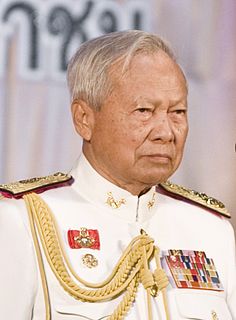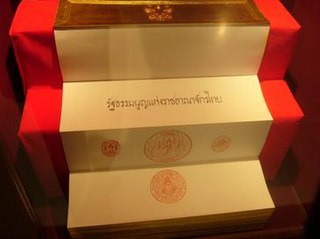Related Research Articles

Thaksin Shinawatra is a Thai businessman, politician and visiting professor. He served in the Thai Police from 1973 to 1987, and was the Prime Minister of Thailand from 2001 to 2006.
Chaiyasit Shinawatra is a former commander-in-chief of the Royal Thai Army.

Prem Tinsulanonda was a Thai military officer, politician, and statesman who served as the Prime Minister of Thailand from 3 March 1980 to 4 August 1988, during which time he was credited with ending a communist insurgency and presiding over accelerating economic growth. As president of the Privy Council, he served as Regent of Thailand from the death of King Bhumibol Adulyadej on 13 October 2016, until the 1 December 2016 proclamation of Vajiralongkorn as King. At the age of 98, Prem was the longest-living Thai Prime Minister.

Somkid Jatusripitak is a Thai economist, business theorist, and politician.

ITV was a television station in Thailand that was owned by iTV Public Company Limited, a unit of Shin Corporation. As Thailand's first UHF channel, the station was started in 1995 when the company was granted a 30-year concession by the Office of the Permanent Secretary to the Prime Minister's Office to operate a free-to-air television station in the Ultra High Frequency (UHF) spectrum at 510-790 MHz. After a lengthy dispute over unpaid concession fees to the Prime Minister's Office, the government's Public Relations Department took over the station in 2007. Its name was changed to Thailand Independent Television (TITV). Following a previously unannounced order of Thailand's Public Relations Department delivered the same day, the station closed on January 15, 2008. In accordance with the Public Broadcasting Service Act B.E.2551(2008), the channel's frequency was assigned to the Thai Public Broadcasting Service.

Internal Security Operations Command or ISOC is the political arm of the Thai military. It was responsible for the suppression of leftist groups from the 1960s to the 1980s. During this period it was implicated in atrocities against activists and civilians. ISOC was implicated in a plot to assassinate Prime Minister Thaksin Shinawatra. After Thaksin was deposed in a military coup, the junta transformed ISOC into a government within a government, giving it wide-reaching authority over the National Anti-Corruption Commission, the Department of Special Investigation, and the Anti-Money Laundering Office (AMLO). The junta also authorized it to help provincial authorities in marketing OTOP products. In June 2007, the junta approved a draft national security bill which gave ISOC sweeping powers to handle "new forms of threats" to the country. The ISOC revamp modelled it after the US Department of Homeland Security and gave ISOC sweeping new powers to allow the ISOC chief to implement security measures, such as searches without seeking prime ministerial approval.

Sonthi Boonyaratglin is a Thai former Commander-in-Chief of the Royal Thai Army and former head of the Council for National Security, the military junta that ruled the kingdom, of Iranian descent. He was the first Muslim in charge of the army of the mostly Buddhist country. On 19 September 2006, he became the de facto head of government of Thailand after overthrowing the elected government in a coup d'état. After retiring from the Army in 2007, he became Deputy Prime Minister, in charge of national security.

The 2006 Thai coup d'état took place on 19 September 2006, when the Royal Thai Army staged a coup d'état against the elected caretaker government of Prime Minister Thaksin Shinawatra. The coup d'état, which was Thailand's first non-constitutional change of government in fifteen years, followed a year-long political crisis involving Thaksin, his allies, and political opponents and occurred less than a month before nationwide House elections were scheduled to be held. It has been widely reported in Thailand and elsewhere that General Prem Tinsulanonda, Chairman of the Privy Council, was the mastermind of the coup. The military cancelled the scheduled 15 October elections, abrogated the 1997 constitution, dissolved parliament and constitutional court, banned protests and all political activities, suppressed and censored the media, declared martial law nationwide, and arrested cabinet members.
The Council for National Security or CNS, formerly known as the Council for Democratic Reform or CDR, was the military junta that governed Thailand after staging a coup d'état against Prime Minister Thaksin Shinawatra.

Mom Rajawongse Pridiyathorn Devakula is a Thai economist. He was the Governor of the Bank of Thailand from 2001 to 2006. Following the 2006 Thai coup d'état he served as minister of finance and deputy prime minister in the interim civilian government led by Prime Minister Surayud Chulanont. Following the 2014 Thai coup d'état he was appointed as a deputy prime minister in the first military appointed cabinet under General Prayut Chan-o-cha. Two days earlier he had resigned from his position as chairman of the board of Post Publishing PLC, the publisher of the Bangkok Post, Thailand's leading English-language newspaper.
The 2006 Thailand coup d'état took place on 19 September 2006, when members of the Royal Thai Army staged a coup against the government of Prime Minister Thaksin Shinawatra. The coup, which is Thailand's first in fifteen years, followed a year-long political crisis involving Thaksin and political opponents and occurred less than a month before elections were scheduled to be held, on 15 October. The military postponed the upcoming elections, suspended the Constitution, dissolved Parliament, banned protests, suppressed and censored media outlets, declared martial law, and arrested Cabinet members. The coup was bloodless, with no casualties reported.

Surayud Chulanont is a Thai politician. He was the Prime Minister of Thailand and head of Thailand's interim government between 2006 and 2008. He is a former supreme commander of the Royal Thai Army and is currently Privy Councilor to King Vajiralongkorn.
The Constitution of the Kingdom of Thailand (Interim), Buddhist Era 2549 (2006) was an interim constitution of Thailand enacted to replace the 1997 Constitution which was repealed by the Council for Democratic Reform (CDR) after it seized power from the government of Thaksin Shinawatra in the 2006 Thailand coup. Released on 27 September 2006 and promulgated on 1 October 2006, the Constitution allowed the junta to retain significant control over the appointed civilian government and the drafting of a permanent constitution. The CDR would be transformed into a permanent Council for National Security (CNS) and would appoint the head of the executive branch, the entire legislature, and the drafters of a permanent constitution. The Constitution made no mention of succession, instead leaving it to "constitutional practice." The draft came under strong public criticism as being a step backwards from the 1997 "People's Constitution". The constitution did not repeal junta bans restricting freedom of speech, assembly, and political activity; these bans were subsequently revoked by an act on 27 December 2006.
Sitthichai Pokai-udom is Thai inventor and politician. He was appointed as Minister of Ministry of Information and Communication Technology of Thailand in 2006 by a military junta. He founded the Mahanakorn University of Technology in 1990. From 1990 to 1998, he was a visiting professor at the University of London's Imperial College of Science, Technology and Medicine. From 1984 to 1986, he was appointed to the board of directors of the Communications Authority of Thailand. He is married to Pornpan Mahattananon Pookaiyaudom and has one son and two daughters. He is the son of a wealthy Shanghainese general, C.L. Shin, who fought for Chiang Kai-shek and left China for Thailand in 1948. He changed his Chinese name to a Thai one at the age of 10.

The Constitution of the Kingdom of Thailand, Buddhist Era 2550 (2007) was the constitution of Thailand which was in effect from 2007 to 2014.

The 2006 Bangkok bombings occurred on 31 December 2006 and 1 January 2007, during New Year's Eve festivities in Bangkok, Thailand. Four explosions went off almost simultaneously in different parts of the city at around 18:00 local time, followed by several more explosions within the next 90 minutes. Two explosions also occurred after midnight. In total, eight explosions were reported during the night.
General Saprang Kalayanamitr is a retired officer of the Royal Thai Army, Assistant Secretary-General of the Council for National Security, Commander of the junta's 14,000-man anti-protest force, Chairman of the Board of Directors of Airports of Thailand (AoT), and also Chairman of the Boards of TOT and CAT Telecom, two major Thai state-owned telecommunication companies.
The domestic policy of Surayud Chulanont as Prime Minister of Thailand affected the Thai economy, human rights, education, and numerous other areas. Appointed Prime Minister by a military junta that overthrew the government of Thaksin Shinawatra, he has been praised for his efforts to reverse the policies of the Thaksin government and to reduce the role of foreigners in the Thai economy. However, his policies have been controversial, and he been accused of economic mismanagement, rampant human rights abuses, and allowing the escalation of the South Thailand insurgency.
Suraphol Nitikraipot is a Thai professor of law, rector of Thammasat University, and an appointed member of the Thai military junta's National Legislative Assembly.
People's Television (PTV) was a Thai satellite television station. It was established by former executives of the Thai Rak Thai party after the 2006 Thailand military coup overthrew the Thai Rak Thai-led government. It launched despite warnings from the Council for National Security, the military junta that seized power. PTV executives insisted that if ASTV could operate, then so could PTV.
References
- ↑ "Chatumongol tipped as PM", Bangkok Post , 23 September 2006
- ↑ "Supachai 'to discuss terms' for PM's post" Archived 22 October 2006 at the Wayback Machine , The Nation , 26 September 2006
- ↑ "Warning from Suryud: Thaksin's return 'a threat'" Archived 12 October 2006 at the Wayback Machine , The Nation , 28 September 2006
- ↑ "Surayud leads nominees for PM" Archived 29 January 2016 at the Wayback Machine , Bangkok Post , 27 September 2006
- ↑ "Pridiyathorn out of contention for interim PM; prominent pro-democracy citizens picked to advise, boost confidence" Archived 9 November 2006 at the Wayback Machine , The Nation , 27 September 2006
- ↑ "Surayud Chulanont named Thailand's new Prime Minister" Archived 30 October 2006 at the Wayback Machine , Phuket Post, 1 October 2006
- ↑ "Thai military authority announces interim constitution", People's Daily , 1 October 2006
- ↑ "Kraisak set for Foreign portfolio" Archived 11 October 2006 at the Wayback Machine , The Nation , 21 September 2006
- ↑ "Jaral approved as new permanent secretary for Justice", The Nation , 27 September 2006
- ↑ "Thai junta to work alongside new PM: coup leader" Archived 12 March 2007 at the Wayback Machine , The Nation , 26 September 2006
- ↑ "Military set to publish interim constitution" Archived 12 March 2007 at the Wayback Machine , Bangkok Post , 25 September 2006
- ↑ "Interim charter draft" Archived 6 February 2007 at the Wayback Machine , The Nation , 27 September 2006
- ↑ The Nation, NLA 'doesn' t represent' all of the people Archived 2 November 2006 at the Wayback Machine , 14 October 2006
- ↑ The Nation, Assembly will not play a major role Archived 16 January 2007 at the Wayback Machine , 14 October 2006
- ↑ "The Nation: US ambassador first to pay Surayud a visit, October 3 2006"

